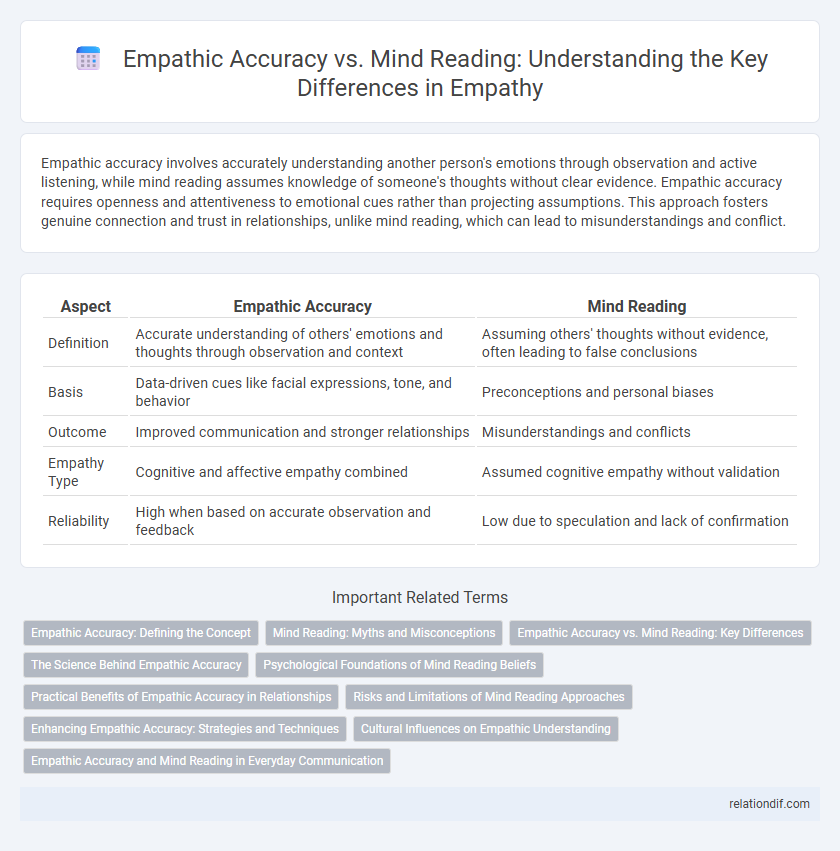Empathic accuracy involves accurately understanding another person's emotions through observation and active listening, while mind reading assumes knowledge of someone's thoughts without clear evidence. Empathic accuracy requires openness and attentiveness to emotional cues rather than projecting assumptions. This approach fosters genuine connection and trust in relationships, unlike mind reading, which can lead to misunderstandings and conflict.
Table of Comparison
| Aspect | Empathic Accuracy | Mind Reading |
|---|---|---|
| Definition | Accurate understanding of others' emotions and thoughts through observation and context | Assuming others' thoughts without evidence, often leading to false conclusions |
| Basis | Data-driven cues like facial expressions, tone, and behavior | Preconceptions and personal biases |
| Outcome | Improved communication and stronger relationships | Misunderstandings and conflicts |
| Empathy Type | Cognitive and affective empathy combined | Assumed cognitive empathy without validation |
| Reliability | High when based on accurate observation and feedback | Low due to speculation and lack of confirmation |
Empathic Accuracy: Defining the Concept
Empathic accuracy refers to the ability to accurately perceive and understand another person's thoughts and feelings through cues such as verbal expressions, body language, and emotional tone. Unlike mind reading, which implies assuming others' internal states without evidence, empathic accuracy relies on observable data and context to interpret emotional experiences correctly. This skill enhances interpersonal communication by fostering genuine understanding and reducing misunderstandings in social interactions.
Mind Reading: Myths and Misconceptions
Mind reading often gets confused with empathic accuracy, but it involves incorrectly assuming the exact thoughts or feelings of others without sufficient evidence. Common myths suggest mind reading is an effortless ability to know another's mind, yet it largely relies on subjective interpretations prone to biases. Understanding these misconceptions helps highlight that genuine empathy requires active listening and validation, rather than unfounded assumptions.
Empathic Accuracy vs. Mind Reading: Key Differences
Empathic accuracy involves accurately perceiving another person's thoughts and feelings through observable cues, whereas mind reading often refers to assuming what others think without sufficient evidence. Empathic accuracy relies on attention to verbal and non-verbal signals, promoting effective communication and understanding in relationships. Mind reading can lead to misunderstandings and conflicts, as it typically involves projecting one's own beliefs or assumptions onto others rather than objective interpretation.
The Science Behind Empathic Accuracy
Empathic accuracy refers to the ability to precisely infer others' thoughts and feelings through observable cues, grounded in psychological research involving real-time interactions and validated assessments. Studies utilizing neuroimaging techniques reveal that empathic accuracy activates brain areas related to social cognition, such as the medial prefrontal cortex and temporoparietal junction. Unlike mind reading, which implies guessing without evidence, empathic accuracy depends on systematic interpretation of behavioral and contextual information to understand another person's mental state.
Psychological Foundations of Mind Reading Beliefs
Empathic accuracy involves accurately perceiving another person's thoughts and feelings based on observable cues, while mind reading refers to the cognitive assumption that one can know others' mental states without sufficient evidence. Psychological foundations of mind reading beliefs are rooted in theory of mind development and social cognition, where individuals infer intentions and emotions to navigate interpersonal interactions. Errors in mind reading often arise from cognitive biases and overgeneralizations, highlighting the importance of verifying assumptions through communication for effective empathy.
Practical Benefits of Empathic Accuracy in Relationships
Empathic accuracy enhances relationship quality by enabling partners to accurately perceive each other's thoughts and feelings, fostering deeper understanding and trust. Unlike mind reading, which relies on assumptions, empathic accuracy reduces misunderstandings and conflict through precise emotional insight. Practical benefits include improved communication, increased emotional support, and stronger conflict resolution skills, leading to more satisfying and resilient relationships.
Risks and Limitations of Mind Reading Approaches
Mind reading approaches often rely on assumptions and can lead to inaccurate interpretations of others' thoughts and feelings, increasing the risk of misunderstandings and damaged relationships. Empathic accuracy, which involves careful observation and validation of emotions, reduces these risks by fostering genuine understanding and effective communication. Overdependence on mind reading may also neglect individual differences and contextual factors, limiting its reliability in complex social interactions.
Enhancing Empathic Accuracy: Strategies and Techniques
Enhancing empathic accuracy involves refining the ability to accurately perceive and understand others' thoughts and feelings without projecting personal biases. Techniques such as active listening, focused attention on verbal and nonverbal cues, and seeking clarifying feedback improve the interpretation of emotional states. Training programs and mindfulness practices have shown significant effectiveness in increasing empathic accuracy by promoting emotional regulation and perspective-taking skills.
Cultural Influences on Empathic Understanding
Empathic accuracy, the ability to accurately perceive others' emotions and thoughts, is deeply shaped by cultural norms and communication styles, which define emotional expressions and interpretive frameworks. Mind reading, often mistaken for empathic accuracy, tends to rely on assumptions and stereotypes influenced by one's cultural background, potentially leading to misunderstandings across diverse social contexts. Cross-cultural empathy training enhances empathic accuracy by fostering awareness of cultural values, nonverbal cues, and contextual differences critical for genuine empathic understanding.
Empathic Accuracy and Mind Reading in Everyday Communication
Empathic accuracy involves accurately perceiving another person's thoughts and feelings through cues such as facial expressions, tone, and body language, which enhances genuine understanding in everyday communication. Mind reading, by contrast, often relies on assumptions and stereotypes, potentially leading to misunderstandings and conflicts. Developing empathic accuracy improves interpersonal relationships by fostering trust and reducing communication errors.
Empathic Accuracy vs Mind Reading Infographic

 relationdif.com
relationdif.com